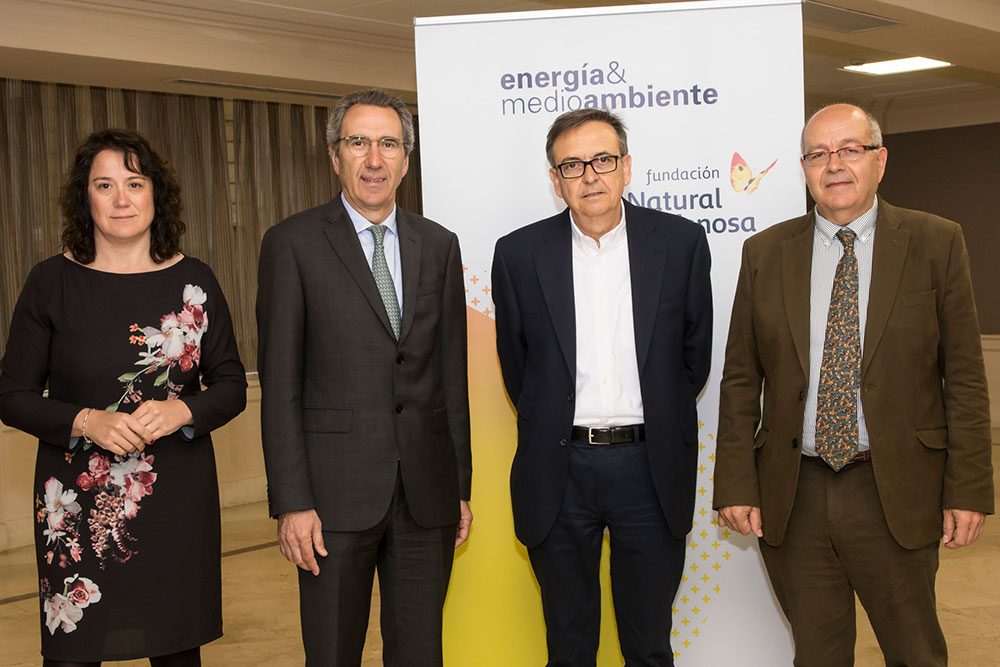Improving efficiency in irrigation leads to savings of up to 20% in irrigation communities’ energy bills
The Gas Natural Fenosa Foundation organised a conference in Valencia today, entitled ‘Energy and Water’, during which various experts presented practical cases on integrated energy and water management as a key element of efficiency, saving and sustainability.
Energy consumption for irrigation, which represents 2.3% of the national electricity demand, can experience significant savings through the introduction of a set of structural and management measures.
The conference included the presentation of a book entitled “Energía y Agua” (Energy and Water) written by Universitat de Barcelona Professor Miquel Salgot, which describes how energy plays a decisive role in the entire water cycle and vice versa.

Managing Director for Industry and Energy for the Valencia Regional Government Diego Macià Gas Natural Fenosa Foundation CEO Martí Solà officially opened the seminar in Valencia today, entitled ‘Energy and Water’ Attended by over 100 professionals, the conference featured experts analysing the main aspects of energy management where water plays a decisive role and, by the same token, the facets of water system management where energy is an important factor.
During the presentation, Gas Natural Fenosa Foundation CEO Martí Solà highlighted how “the growing scarcity of water is having an increasing impact every day on the reliability and costs of many energy sources, just as energy is playing a decisive role in the entire water cycle. For that reason, the availability, quality and costs of energy are becoming increasingly important for those who manage the water system.”
The Managing Director for Water for the Regional Government of Valencia Manuel Aldeguer explained the importance of integral water and energy management in the regional community of Valencia.
Energy saving and efficiency in irrigation
Research Lecturer at the Spanish National Research Council (CSIC) Enrique Playán emphasised the importance of applying structural and management measures that enable reduced energy consumption in irrigation. He laid out several measures for cutting energy bills, including improvements to pumping systems, which in some areas can lead to savings of up to 20% on irrigation communities’ energy bills.
He also pointed out the need to use water at times of day when electricity is cheaper, reduce the energy required for sprinklers or drip systems, and cut down the energy lost in private or collective grids. In addition, he highlighted the importance of irrigation advice from the irrigation communities themselves, not just for prevention but also to shore up the success of these innovative measures. Playán remarked that irrigation, which represents 2.3% of Spain’s electricity demand, concentrated in the spring and summer, could act as an effective regulator of the electrical system, thanks to its capacity for consuming energy when there is less demand or surplus production, and not during demand peaks.
Meanwhile, Universitat de Barcelona Faculty of Pharmacy Professor Miquel Salgot presented a book entitled ‘Energy and Water’, commissioned by the Gas Natural Fenosa Foundation, detailing the importance of the water-energy nexus and studying its interrelations, which, as it points out, “are fundamental for understanding and good environmental management and for the fight against climate change”.
Water and energy in the industrial sector
A professional at Gas Natural Fenosa’s combined cycle-power plant in Sagunto, Laura Aznar, explained the use of sea water there as a cooling liquid for its cooling towers, for feeding the boiler after it has passed through a water-treatment plant, and for the fire-fighting network, among other uses which have a specific plan for water treatment.
O&M Project Engineering Manager Sergio Bolinches talked about energy efficiency in wastewater purification processes and showed real cases of initiatives taken that “succeeded in obtaining significant energy savings at the various treatment stages in the purification stations we currently manage”.
Meanwhile, Veolia Water Technologies Technical Manager Joan Sanz shared an example of the water-reclamation plant at the Camp de Tarragona petrochemical complex, which enables water to be reused thanks to an advanced reclamation treatment for industrial uses. Finally, Global Omnium Institutional Relations Manager Jaime Castillo went over the path taken by the company to digitally transform water-supply management, based mainly on remote reading.
Share